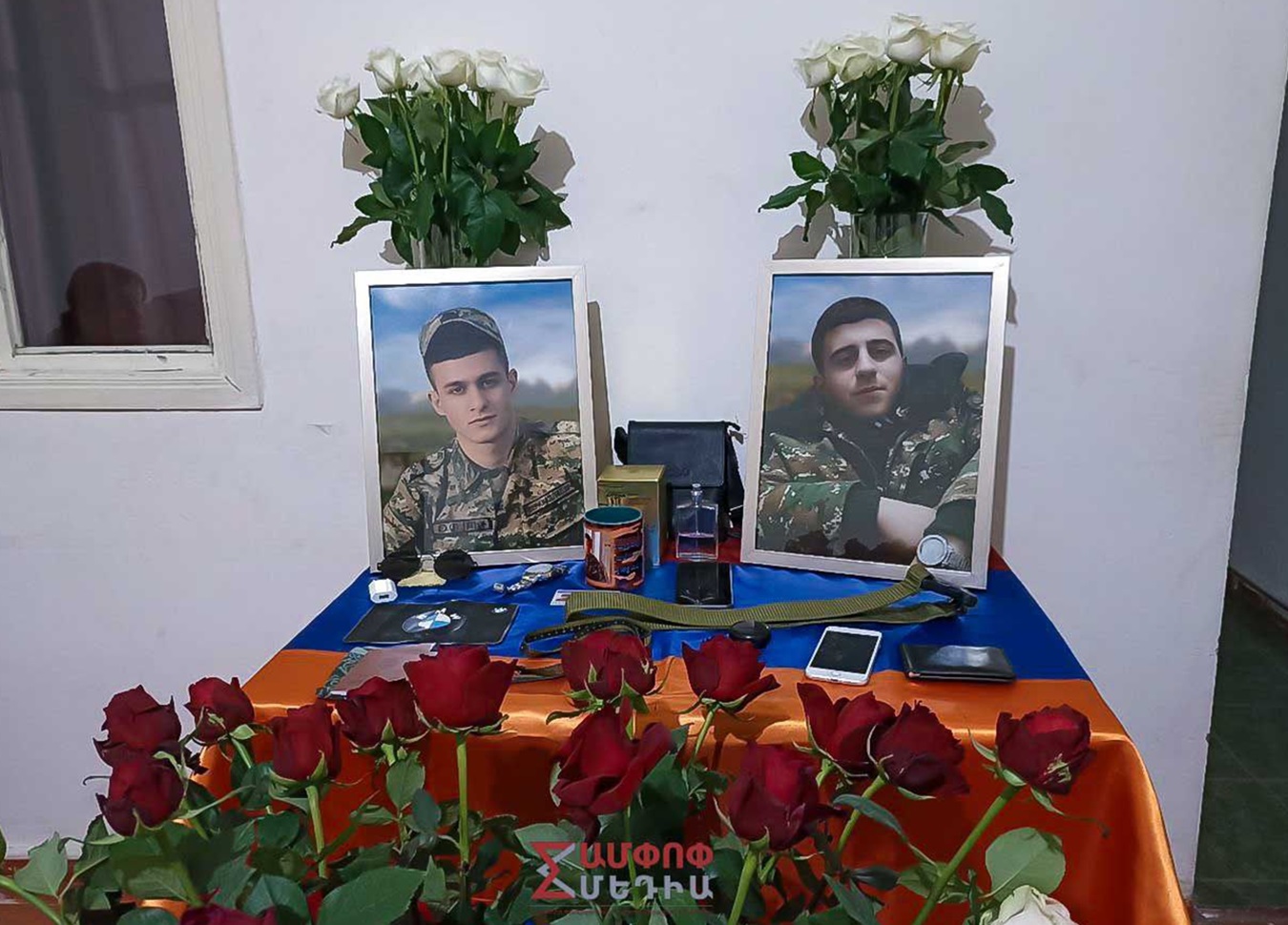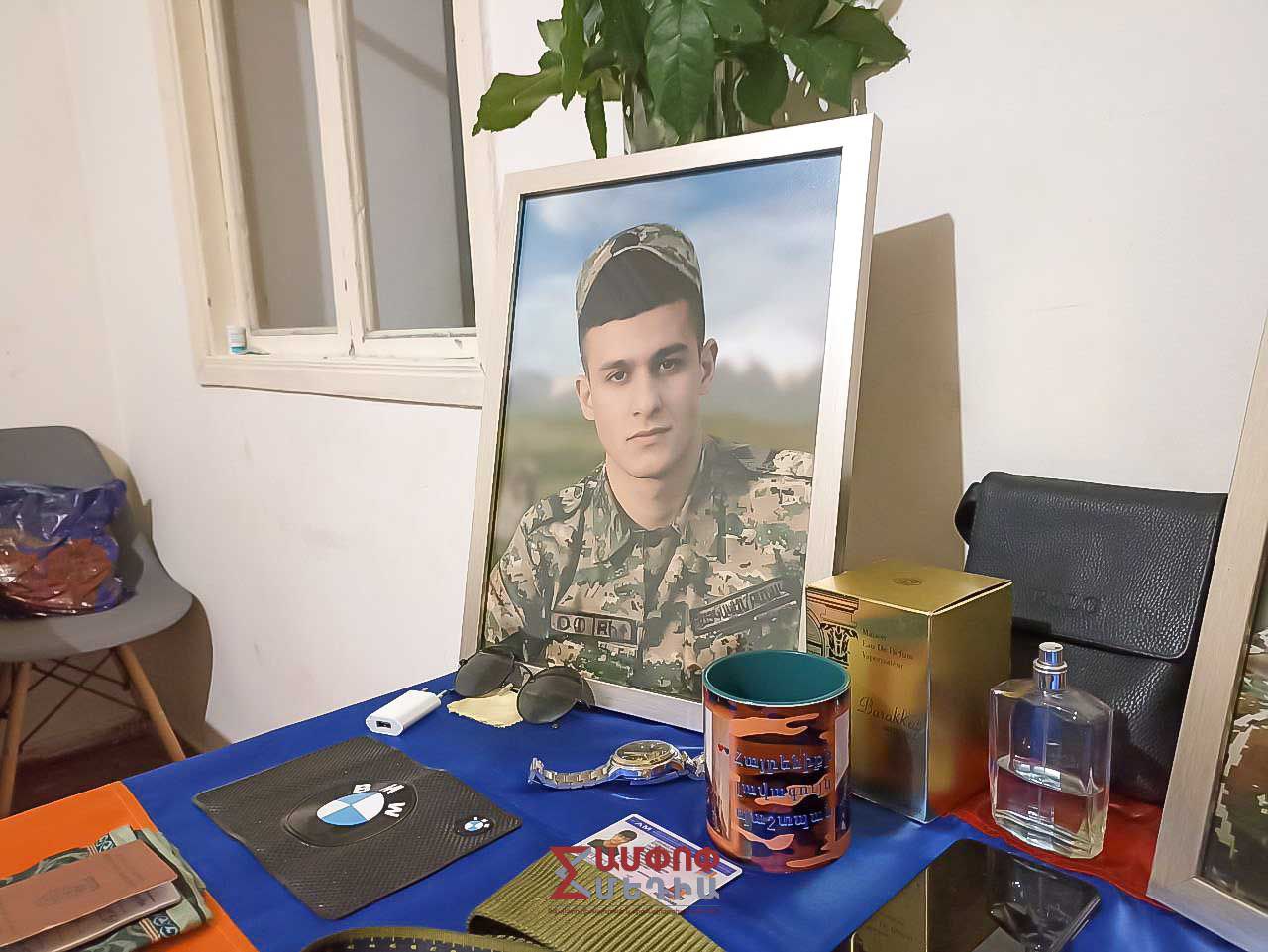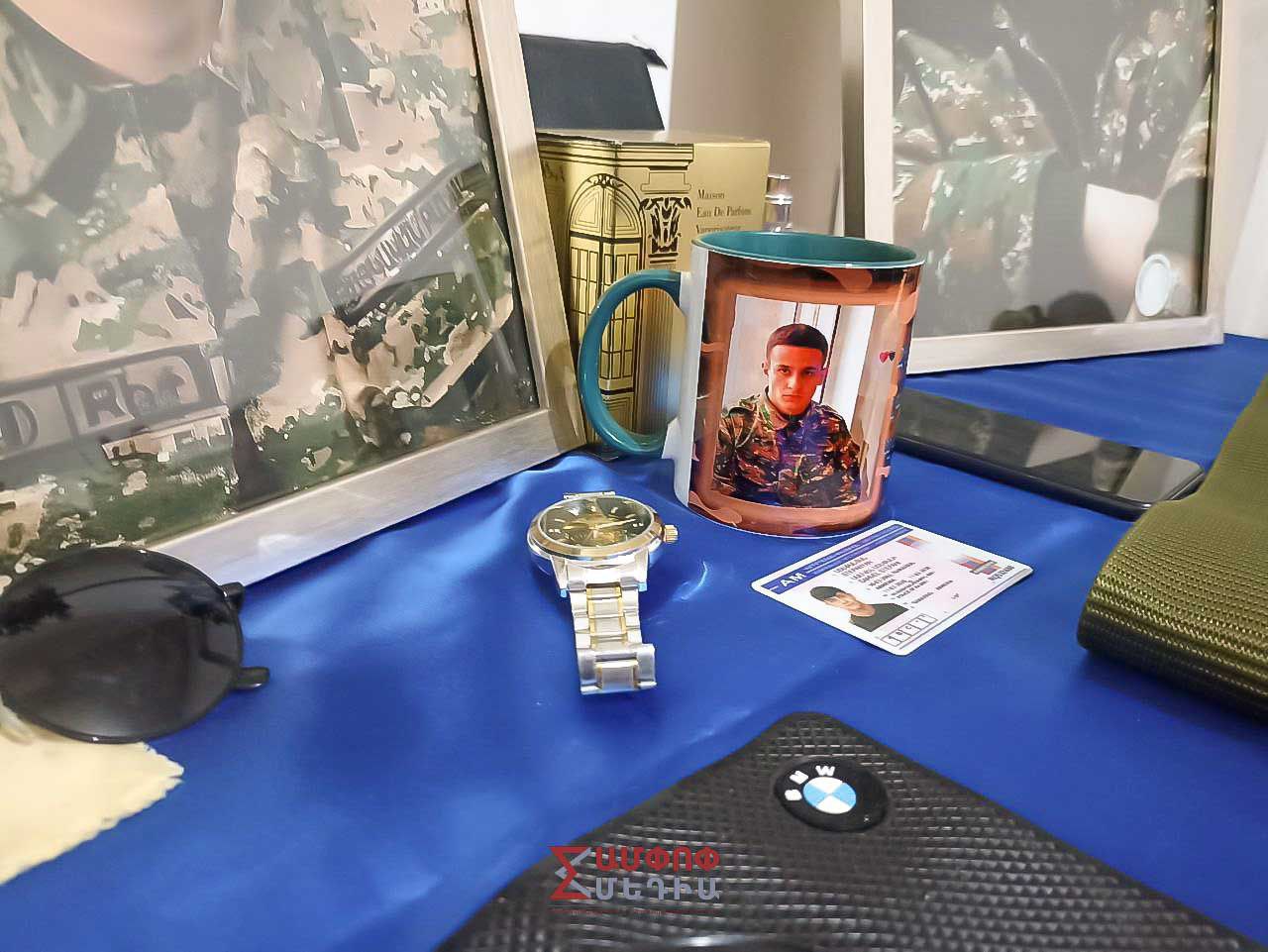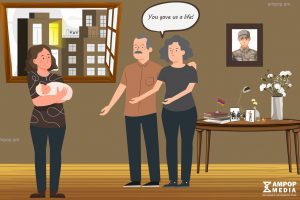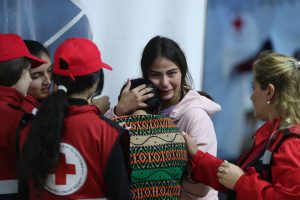Brothers Samvel and Arsen Stepanyans died within a few hours’ span on 19 September, the day Azerbaijan launched an assault against Artsakh; Samvel was killed in the Yeghnikner military base, Arsen died near the village of Tchankatagh in the neighborhood of Stepanakert.
Arsen, 19, and Samvel, 21, both machine gunners, were contract military servicemen in the defense army of Artsakh. Samvel was supposed to leave his post on 14 September, but was told to remain there until further order; Arsen was called on duty the week before by an emergency order, though to Tchankatagh, which was not his regular place of service. Their mother, Alla, still has unanswered questions about the reasons and the circumstances in which her younger son was sent to Tchankatagh.
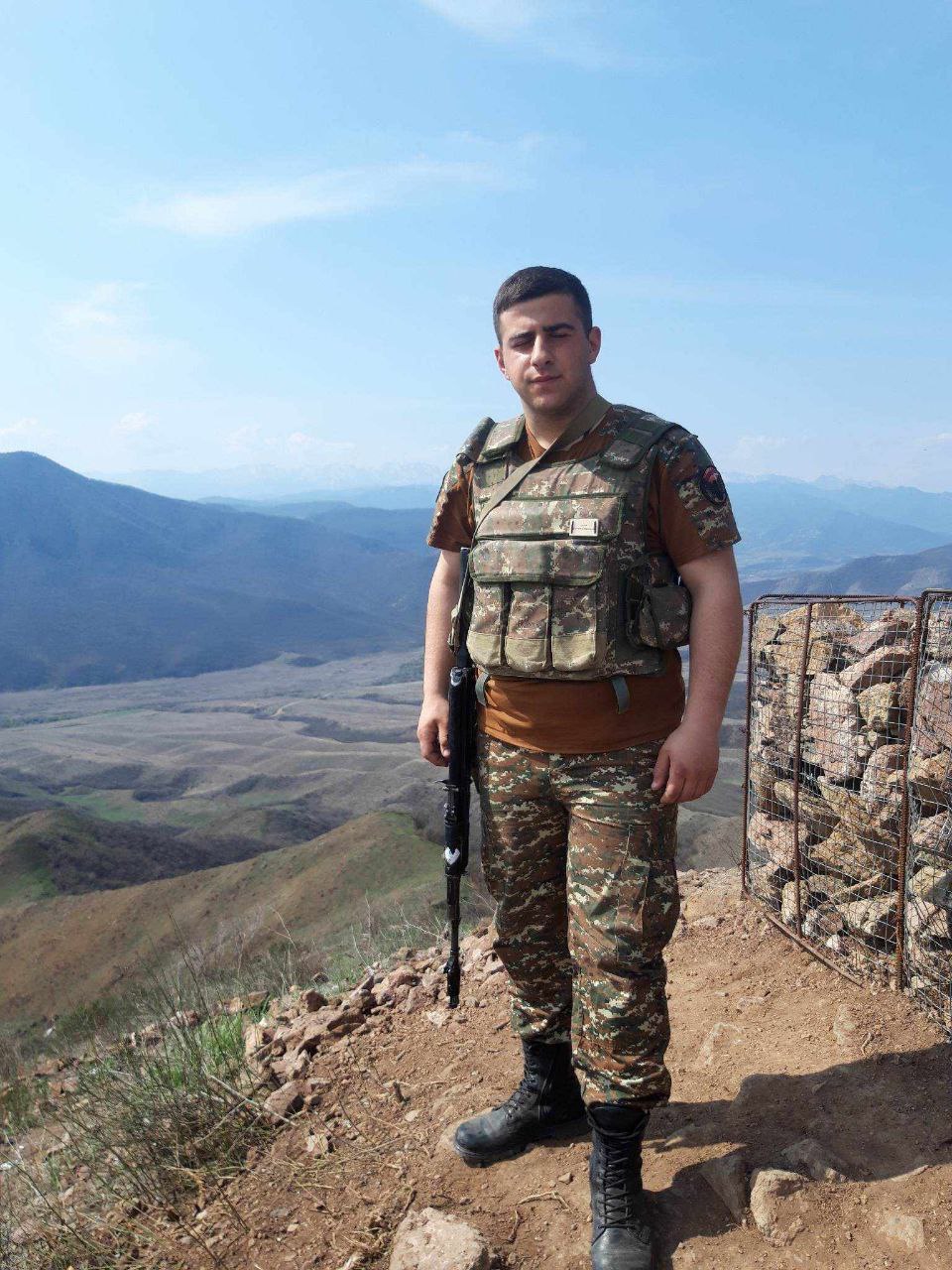
“I have learned my Arsen was in Tchankatagh on 17 September. He would regularly ask to send me cold drinking water. I would freeze water every other day and would send it to the military post with my father. He hadn’t asked for water for a few days in a row, so, I made a phone call to check on him; he said, no, mum, you can’t send it to where I am. That’s how I learned he was in Tchankatagh,” the mother recalls.
Alla Abrahamyan is a military communication agent. When the war broke, she was standing in a line for cheese, to get just a piece, to have something for her sons, when they are released home:
“I ran to my sister’s and my brother’s kids straightaway, while keeping dialing Arsen; he wouldn’t answer my calls… And I was unable to reach Samvel; I knew his place was out of radio coverage. I called one of my acquaintances and told him I had not heard from Arsen for a while; he did not know Arsen was in Tchankatagh, and tried to encourage me saying I shouldn’t worry about him; but the Tchankatagh direction was under shelling and the village was already taken. I said Arsen was there, my acquaintance was shocked and hang up the phone on me… I put on my uniform and ran to the unit, the inner communication was my last hope,” Alla recalls.
Alla managed to talk to her elder son. Yet, there were no news from Arsen. The loss of contact with Arsen for several hours in a row worried Samvel, too, but he would try to not show own feelings when talking to Alla.
“Samvel was very reserved and serious, and would never share about matters related to his service, neither would he let anyone ask him about it. Let alone calling to the unit he served in or asking about him: I wouldn’t dare to. I did not even know the name of his commander, I heard it by chance. But that day he did not ask me why had I called him, rather he would speak to me softly, assuring his was ok and saying I did not need to worry about him, and should rather try to find Arsen. And then, as the tears burst out of my eyes, he said, don’t worry, mum, Arsen will come out of somewhere soon, he is not someone to be lost. I had the feeling he had either appeared in a tough situation, or had been captured by Turks. And I dreaded this thought.”
Arsen was very different from his brother, Samvel. Arsen was outgoing and cheerful in as much as Samvel was reserved and serious. And Alla had an inner feeling Arsen would soon show.
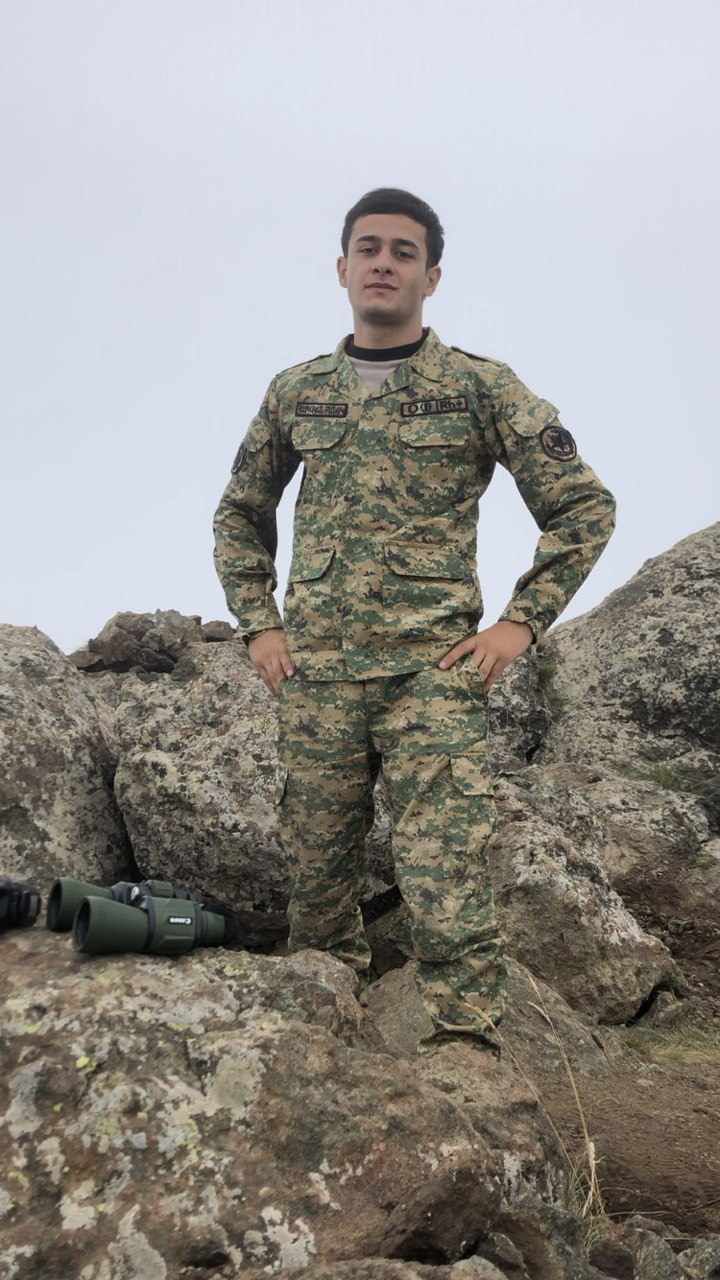
It was the evening of the same day, around 8:10 pm, information came about the air attack on the military unit where Samvel was serving. Alla had the last call with her elder son pleading him to take care of oneself… The contact with Samvel was lost soon after.
Alla’s military friends would try to calm her down saying there might had been damage to communication line, and her sons were most probably fine; but the mother’s heart wouldn’t lie to her.
Alla set up through the night of 19 September waiting for a call from Samvel. Despite her colleagues’ calls to hide in the shelter of her military unit, she stayed up there. In the morning, the Azerbaijani shells had already reached their unit, too, but she would sit motionless, with her hand on the receiver of the phone…
“In the early hours of the day I still had no news from my boys. I was shivering, I couldn’t feel my feet, couldn’t move, as if I hadn’t gone through two wars, and I had that deadly feeling in my heart. It was about 1pm, when a ceasefire was announced, everyone left; I stayed there with the young conscripts,” Alla recalls.
Something had to be done to get rid of the bad feeling and the murderous uncertainty. The head of the communication unit was Alla’s last hope. Anticipating to hear something about Samvel, Alla called him. Yet, her call remained unanswered.
In the evening, she went to the commander to ask his permission to let Samvel leave the post to help her search Arsen. Alla understood the true meaning of the commander’s words: “Ok, go home, we will bring you back tomorrow”, and why exactly the call back from the head of the communication unit that was never made.
In the morning of 21 September Alla’s mother Alvina told her injured soldiers from Samvel’s unit were brought down the posts. In fact, those were bodies of killed soldiers, but Alvina had decided she would not break the news to Alla right away.
Samvel’s name was there, in the third list of those, whose bodies were brought to the Martakert morgue. Alla was the one to identify his body.
“I was waiting for him to go together to look for Arsen. Who knew I would find him first.”
The morgue in Martakert was non-operating due to electric power outage; the road to Stepanakert was already blocked by Azerbaijanis, and there was shortage of coffins. There was no opportunity to keep further the bodies, and so bodies were buried whenever and whichever way it proved possible. It was decided to burry Samvel’s body without coffin, too.
“I told them: I don’t care how you do it, but you have to have my boy transported to Yerablur. They would say there were no coffins, and I said, I didn’t care, I said they should find wood logs somehow, make a coffin, because my son was going to be buried in Yerablur.”
Making sure Samvel’s body was being transported to Armenia, Alla continued her search for Arsen, in Stepanakert, all the way from the Ministry of Defense, to the Ministry of Extreme Situations, and, the Ombudsperson, to get any information about her son.
At about 6:30 am of 25 September Alla got a call from an unknown phone number, which killed the last hope to find her younger son alive. On 27 September the rescue teams of the Ministry of Extreme Situations found Arsen’s body.
The body was transported to Armenia the next morning.
“That was the day we left Stepanakert, too. We reached Goris and went to the local morgue only to hear there were no bodies identified under the names we mentioned. Part of the bodies was sent further in a third vehicle to Yerevan, to the morgue on Heratsi Street, because of the overload. But we would not find my son’s body there either.”
Arsen’s body was found days later.
The body had already changed to the extent of unrecognizability. It was Arsen’s uncle, who first identified him; and yet, yielding to the mother’s pleas to see him for one last time, despite the condition, Alla, too, took part in the identification.
The two brothers, Samvel and Arsen, were buried on 9 October, in Yerablur.
None of the commanders of soldiers who fell like heroes fiercely defending native Artsakh attended the funerals. There were military people, who came, but those were the boys’, Mrs. Alla’s, her brother’s and her sister’s combat friends.
“I have died and resurrected so many times, as I helped the injured, rushing them to hospital, to help them live… I sympathized with each and every one, and yet my two boys were left all alone. When I called Samvel’s commander, he extended his condolences, saying: you are a servicewoman, you know what war is, there were just 9 people in the post when 200 Turks attacked it. Why would there be just 9 of them, where were they, the commanders, why weren’t they standing by the side of the soldiers?!”
Alla had once sworn to never leave Artsakh. She would repeat she would stay there even if just one person remained there. Alvina, Alla’s mother, reminds another thought of hers: “Homeland is the one thing worth dying for”.
But the blow was too hard: the loss of Artsakh, and the dear home, and her two sons, leaving the woman longing for someone to call her a Mother …
Photos of Alla’s sons and only few of Samvel’s personal belongings decorating one of the corners of a rented house, are all that is now left of their life. Those personal belongings were brought by Samvel’s combat friends, with nothing left from Arsen. Alla did not take anything from their home, not even documents. When asked about what she brought with her from Artsakh, she responds: two bodies.
Written and photos by: Lilit Poghosyan
The archival photos were provided by Alla Abrahamyan
This article has been written in cooperation with the Friedrich Ebert-Stiftung (FES).
© All the stories, infographics and other visuals bearing the Ampop Media logo is possible to publish on other audiovisual platforms only in case of an agreement reached with Ampop Media and/or JFF.
Փորձագետի կարծիք
First Published: 01/12/2023


